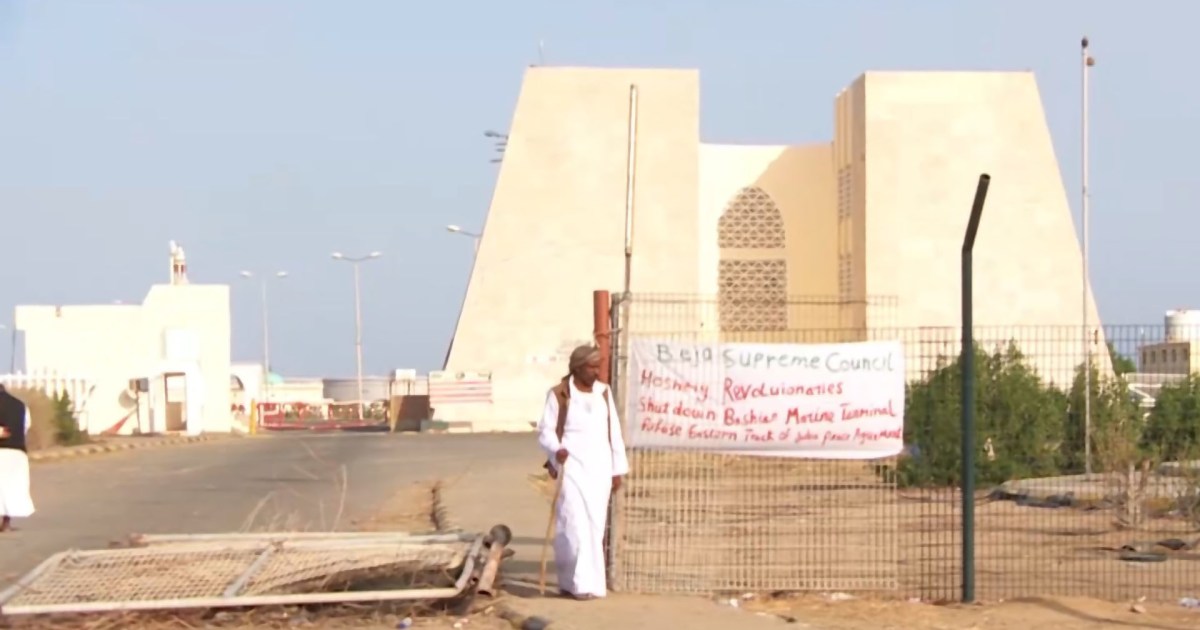A delegation from the transitional government in Sudan is expected to head - today, Sunday - to the Red Sea state, after the closure of the oil pipeline feeding the capital, Khartoum, by protesters seeking to fulfill the demands of the residents of the east of the country, at a time when a Sudanese minister warned of a disaster due to stopping the flow of oil.
Al-Jazeera correspondent quoted a source in the Sudanese Sovereign Council as saying that a delegation from the transitional government headed by Shams El-Din Kabbashi, a member of the council, will arrive today in Port Sudan, the capital of the Red Sea State, to monitor the developments of the situation.
Yesterday, Saturday, individuals belonging to the Supreme Council of Beja Opticals and Al-Omoudiya closed the oil pipeline in the areas of Dahant and Haya (eastern Sudan), in the context of the council's escalation of protests against the eastern path within the peace agreement, and to demand development and an end to marginalization.
Yesterday, Saturday, Sudanese Energy and Oil Minister Jaden Ali Obaid warned of a catastrophe in the country, as a result of the closure of the pipeline transporting oil derivatives to Khartoum and the two oil export ports in the city of Port Sudan (east) by the Supreme Council of Beja Opticals and independent columns.
Obaid said - in a statement to Al Jazeera - that there is a danger that the oil transmission lines will be damaged if this closure continues, which he described as dangerous and unimaginable, adding that the flow of crude oil from production areas to export ports is governed by international agreements, and it is a supreme interest of the state that cannot be touched. .
The Supreme Council of the Beja and Independent Amaudists are leading protests in eastern Sudan, in the face of the central government in Khartoum, to achieve a number of demands, including the abolition of the eastern Sudan track in the Juba negotiations, the dissolution of the government, the formation of a military council, and it threatens the right of self-determination for eastern Sudan.
It is noteworthy that this council is a political component that emerged during the Juba negotiations between the government and the Revolutionary Front, and it consists of civil and party leaders and unorganized youth groups.
Continuous escalation steps
The leader of the Supreme Council of Beja Opticals, Muhammad Oshik, threatened other escalatory steps, including Internet and communications lines in the Red Sea, unless there are initiatives for a solution by the government.
On September 17, the Supreme Council of Beja and Al-Amoudiya Opticals announced the closure of a number of roads linking eastern Sudan with the rest of the country, and also closed a number of ports on the Red Sea, including the port of Port Sudan, in parallel with the complete closure of the road leading to the city of Port Sudan. .
The council said that it would prevent cars and buses from crossing into and out of Port Sudan at the Aqaba area, but - in return - it announced a partial lifting of the closure on Port Sudan airport for a period of 72 hours.
On Friday, the head of the Supreme Council for Beja Opticals and Al-Amoudiya, Muhammad Al-Amin Turk, launched a violent attack on Prime Minister Abdullah Hamdok, and demanded him to resign, saying that Hamdok should prosecute those he accused of attempting a coup or confessing lies to the people and the international community.
opt out
On the other hand, leaders of the Supreme Council of Native Administration in eastern Sudan renewed their support for the eastern path in the Juba Agreement, and their refusal to close roads and facilities by the Supreme Council of Beja's visions.
Interfering people from the leaders of the Council said in front of a public gathering in Kassala State that the government should implement the path as it represents all regions of the east, and it will be defended by all means.
They also held the federal government responsible for the current situation, after it had turned into a government of quotas and parties, according to their description.
They called on the regular forces to play their role in protecting vital national institutions in the east of the country, as they put it.
Video clips showed thousands of Sudanese tribes in eastern Sudan flocking to the Shambub area in Kassala State, to express their support for the eastern path and the democratic transition in the country.
Since August 21, 2019, Sudan has been going through a 53-month transitional period that ends with holding elections in early 2024, during which power is shared by the army, the Forces of Freedom and Change and armed movements that signed a peace agreement with Khartoum on 3 October.

